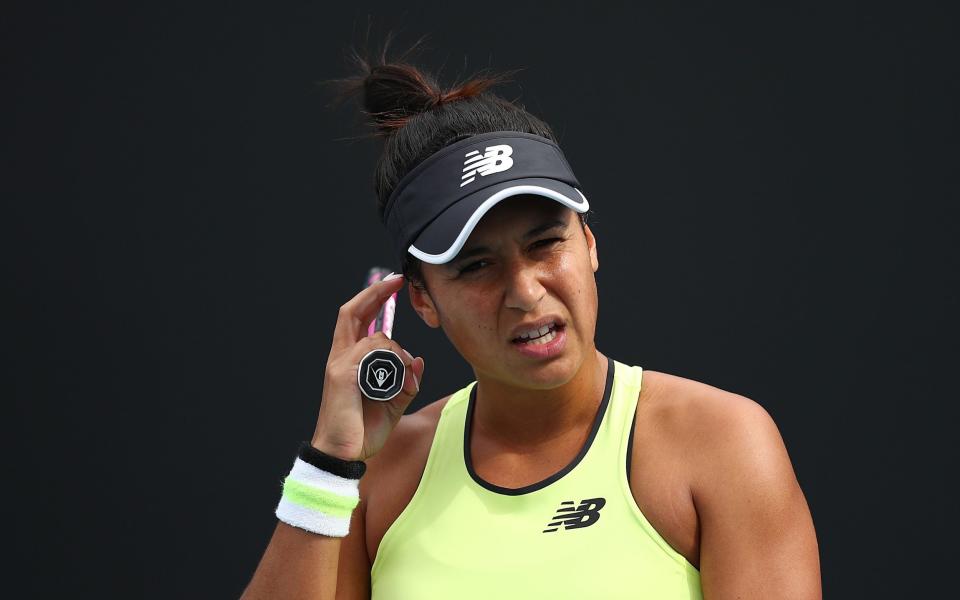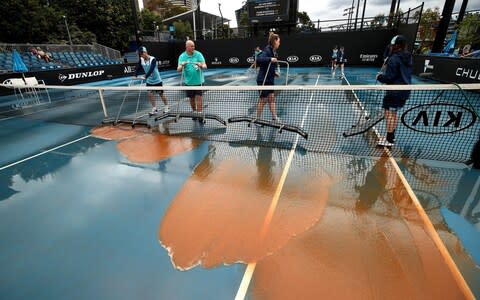Heather Watson suffers rapid Australian Open second round exit at hands of Elise Mertens

Heather Watson failed to last an hour in her second-round match against Elise Mertens on Thursday morning. After playing a competitive first set, Watson lost her bearings completely and went down to a 6-3, 6-0 defeat in just 56 minutes. It was the third-shortest women’s match of the week so far.
The result was all the more disappointing because Watson had beaten Mertens only a week ago in Hobart. But Mertens is the 14th seed here – a serious performer who reached the semi-finals of this tournament two years ago. Standing several inches taller than Watson, at 5ft 10in, she applied considerably more weight to her groundstrokes and effectively bullied her off the court.
“I definitely played better in the first set but not by a lot,” said Watson. “I felt my level wasn’t there today. With my movement, I was a millimetre or a second too slow to everything. I was letting her dictate. As the match went on, she played better and was more aggressive. I am just not happy with my performance at all.”
The match was delayed until around 4.30pm as the Melbourne Park groundstaff tried to clean red dust off their blue Plexicushion courts. The discolouration was the result of the so-called “dirty rain” that fell in torrential downpours on Wednesday night, combining with a dust storm to turn the Yarra River a murky chocolate brown.
This was the latest extraordinary weather event in Melbourne over the past week, after bushfire smoke and golf-sized hailstones. “It didn’t seem clean, the court that we were on,” said Watson. “It was pretty dirty. I saw other courts on TV and they looked a lot cleaner than ours. But it didn’t play any differently.”
Watson can at least be happy with her Australian summer, which included a semi-final in Hobart and then Wednesday’s win over Kristyna Pliskova – a player ranked a dozen places above her – in the Australian Open’s first round.

Having fallen to No 125 last October, she will finish this tournament in the mid-70s, which gives her a platform to attempt her main career goal for 2020: qualification for the Tokyo Olympics. The cut-off will probably be somewhere around 70, depending on how many players follow Dan Evans’s lead by preferring to accumulate points and prize money on the regular tour.
“The Olympics is the No 1 stage to represent your country, the ultimate,” said Watson. “If Dan went to London 2012, then I think he would go [this year]. That was one of the best experiences of my life.”
By comparison with last year’s Australian Open, when Watson won only three games in a first-round exit to Petra Martic, this has still been a satisfactory week. She will fly home with a 4-2 win-loss record in main-draw matches.
“I remember last year this time I would have be happy to win a single match,” said Watson. “The fact I have played so many here in Australia, I’m feeling good [about that]. Now I will go home. I was going to play the 125k in Newport, the second week of Australia, but I have a few niggles, so I will rest up and get ready for the Fed Cup [in which Great Britain play Slovakia in just over a fortnight’s time in Bratislava].
“In Hobart, I had an abdominal strain,” added Watson. “I have had it taped up every day and it’s still there, probably at its worst today. But it’s no excuse.”

 Yahoo News
Yahoo News 